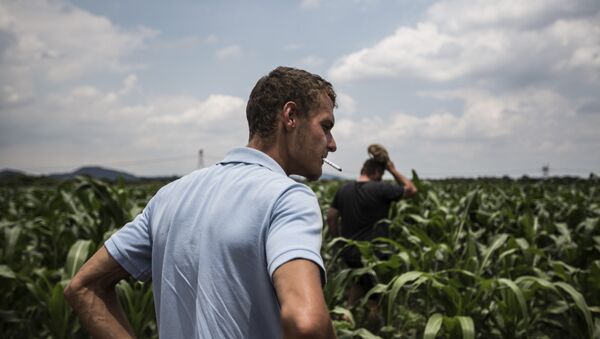A motion by the Marxist opposition party the Economic Freedom Fighters, which will allow land expropriations from white farmers without any compensation, was adopted by 241 votes with only 83 against. The motion was supported by the ruling African National Congress and the President of South Africa Cyril Ramaphosa.

The idea of confiscating land from whites became a key point in the president’s program after his predecessor Jacob Zuma was ousted in February, 2018. According to the South African governmental audit, the white minority of the African country currently owns 72 percent of farmland. The head of the Economic Freedom Fighters Julius Malema, who introduced the initiative, claims the law is mere retribution to the “criminals who stole our land.”
READ MORE: What South Africa Will Be Post-Zuma; The Economics of 'Black Panther'
Twitter exploded at the news of the Marxist motion being overwhelmingly adopted by MPs, with many crying out for conducting an external investigation of the controversial initiative, even comparing it with the infamous apartheid government:
#LandExpropriation:
— Zola Ndwandwe (@ZolaNdwandwe) 27 февраля 2018 г.
This is REVERSE APARTHEID at its worse, @UNHumanRights MUST declare the Land Expropriation without compensation policy a violation of Human Rights of the people and a means to instigate WAR CRIMES in South Africa.
Very UNCONSTITUTIONAL.
White farmers are being slaughtered and now the South African government is coming for their land.
— Based Monitored 🇺🇸🇮🇪 (@BasedMonitored) 28 февраля 2018 г.
Where are you, @realDonaldTrump?
RETWEET so POTUS acts. https://t.co/UnhjOXN0iH
I do not believe that the non Black Community in South Africa is going to roll over and play dead or bury their heads in the sand like an ostrich. They are going to fight the land expropriation amendment and if necessary continue the fight beyond the courts. https://t.co/1oNNxeIRQp
— i.Web.Paul (@iWebPaul) 2 марта 2018 г.
It’s amazing how silent the media has been about the expropriation of land from white farmers (without compensation) in South Africa.
— Redeemed Goddaughter (@XianCorleone) 2 марта 2018 г.
This is pure racism justified only by Marxist morality.
Why the silence?
READ MORE: Zimbabwean Opposition Leader Tsvangirai Dies in South Africa — Reports
Several prominent figures in South Africa slammed the initiative as being nothing other than a theft on racial basis.
“The term ‘expropriation without compensation’ is a form of semantic fraud. It is nothing more than racist theft,” Mr Roets, deputy chief executive of the civil rights group Afriforum, said in a statement.
Thank you @benshapiro & @realDailyWire for your coverage of the South African government’s racist theft ‘land expropriation’ policy.
— Ernst Roets (@ErnstRoets) 2 марта 2018 г.
We invite you to come & visit South Africa. There is a lot that the US can learn from the mistakes made here.https://t.co/ZlrlhDVH3v
South Africa | This is not EXPROPRIATION WITHOUT COMPENSATION, It’s RACIAL ROBBERY!🇿🇦
— Jean Kriek 🇿🇦 (@JeanKriek) 28 февраля 2018 г.
* Whites did not steal any land in South Africa!
* Factual history changed to serve the ANC & EFF's a-historical racial theft!#LandExpropriation🚜 #StopFarmMurders✊ #CommunismAliveAndWell⚠ pic.twitter.com/dTPlaN6JQ5
Some users already started predicting the future dire consequences of this controversial decision:
South Africa is nationalising farmers' land without compensation. A reminder of how this goes:
— wessie du toit (@wessiedutoit) 28 февраля 2018 г.
1. Land taken from productive farmers.
2. Land stops producing food.
3. Food needs to be imported.
4. Inflation sky-rockets.
5. Populism.
6. More land expropriation.
International Law prevents expropriation of land without compensation and it trumps the constitution and any othet laws in South Africa if this happens in SA then the country will face major economic sanctions and all financial aid will stop international trade will collapse.
— Jack London (@JackLon09169906) 1 марта 2018 г.
Several people drew parallels with a similar law that was adopted in Zimbabwe, which resulted in a severe famine in the country, formerly the “breadbasket of Africa”:
I’m praying that South Africa has dispatched a team of experts to analyze what went wrong with the expropriation of land without compensation in Zimbabwe so that they can avoid the hazards.
— Fadzayi Mahere (@advocatemahere) 28 февраля 2018 г.
Most of Zim’s current problems today can be traced back to our underproductive farms.
Make no mistake, South Africa will become the next Zimbabwe in 5-10 years https://t.co/X81Rh7al7T
— Coolman (@nortonpotato) 27 февраля 2018 г.
There were some, however, who actually favored the motion, claiming it will benefit the people in South Africa:
There is no sensible argument against land expropriation without compensation in South Africa. Even in technical economic terms. The scarecrow of ‘constitutionality’ is even the most ridiculous defense. We will take back the country and life will go on.
— The Native (@Zuko_Godlimpi) 28 февраля 2018 г.
Free Education ✔
— KatlehoMK 🇿🇦 (@KatlehoMK) 28 февраля 2018 г.
Land Expropriation w/o compensation ✔
These should've happened in 1994. Nevertheless, South Africa is headed to the right direction.
White farmers previously owned nearly 70% of Zimbabwean farmland, but the situation drastically changed after its former President Robert Mugabe adopted a law in 2000 that forced thousands of white farmers to give up their farms and even flee the country, as many of them were being killed by the local population. Severe famine struck the country, which used to have one of the strongest agricultural sectors in the region, due to mismanagement and the ineffective farming methods of the new owners of the land. Zimbabwe was forced to resort to donor handouts and food imports from neighboring countries.
READ MORE: Cyril Ramaphosa Elected New South African President After Jacob Zuma Resigns
he apartheid government existed in South Africa between 1948 and 1991. During this period, racial segregation and discrimination was officially institutionalized in the country, with the black population being discriminated against by whites, who dominated the economic and political spheres of life. The last parts of apartheid legislation were removed in 1991, with the first multiracial elections held in 1994.


